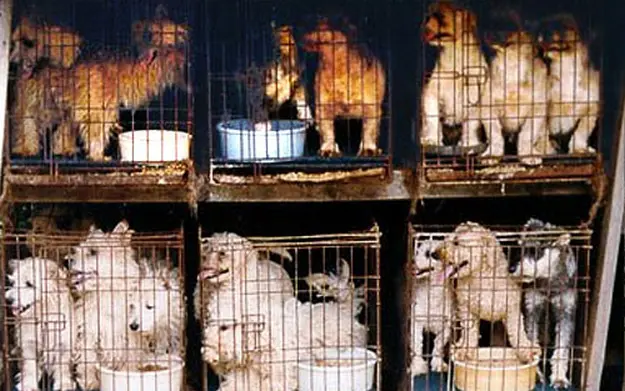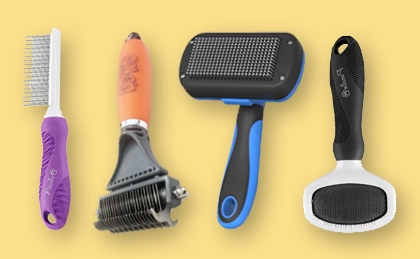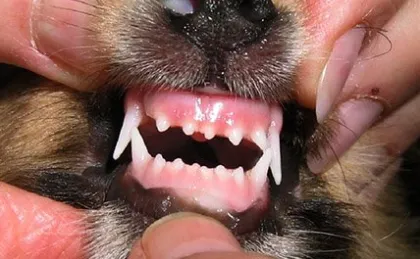8 Reasons to Never Buy Pet Store Puppies
Pet store puppies often come from puppy mills who, unlike ethical breeders, bypass genetic screening and vet checks in exchange for more profits.
How much is that doggy in the window?
We associate pet store puppies with joy and innocence, so it comes as a shock to many that the puppies behind the glass are very often victims of the puppy mill trade.
Puppy mills are commercial dog breeding facilities resembling factory farming. The business model is based on money: how many puppies can be produced and sold at the minimum cost? As a result, multiple dogs are kept in cramped cages for their whole lives, suffering from poor hygiene and nutrition, lack of exercise, lack of vet care, and routine overbreeding.

Puppy mills only exist with the unwitting support of dog lovers.
The horrendous conditions in puppy mills are bad enough. But even once a dog leaves a puppy mill, their troubles are not over. They face lifelong health consequences stemming from their genetic and environmental origins.
Many of the same health conclusions can be drawn from backyard breeding, where pet owners turn their hand to breeding as a hobby without due consideration for genetics.
Please think twice before you visit the pet store. Here are the real implications of buying a pet store puppy.
1. You're Supporting Puppy Mills
When you buy a pet store puppy, you directly support the puppy mill that produced her. Once the pet store takes its cut, the rest of your money goes into the pocket of the puppy mill operator. Don't think that you're saving this one puppy. You're actually condemning many more dogs to a life of captivity and overbreeding.
There are 10,000 puppy mills in the US, producing 2 million puppies every year. The breeding dogs are kept in cramped conditions, are malnourished and poorly exercised, and have a sorry psychological state. Females are wildly overbred, being impregnated every 6-8 months at each heat cycle until they are worn out and euthanized.
Responsible dog breeders never sell their puppies in pet stores. It goes against their desire to ensure good homes, keep track of their puppies as they grow, and learn about any health problems later in life.

To buy a pet store puppy is to fuel the puppy mill trade.
2. Your Puppy May Be Seriously Unhealthy
Coming from puppy mills, pet store puppies have spent their entire lives thus far in cages alongside many other dogs, raising the likelihood of infectious diseases.
What's more, puppy mills spare themselves the expense of genetic screening to ensure that inherited disorders aren't passed on to puppies. This is also the case with many backyard breeders.
Genetic testing is an important part of professional dog breeding. When genetic disease is identified in a dog, he will not be used to breed. This ensures the survival of healthy blood lines while flushing inherited diseases out of the gene pool.
Pet store puppies are much more likely to have one or more genetic diseases, leading to lifelong suffering, expensive vet bills, and even an early death.

Puppy mills don't do genetic testing which leaves puppies more susceptible to inherited diseases.
3. The Guarantee is Worthless
Many pet store puppies come with a guarantee offering a reimbursement should your puppy develop a serious illness. What this really means is that if your new puppy gets sick, the pet store offers to trade puppies instead. They're suggesting you simply euthanize the puppy you have come to love and take on a replacement puppy mill victim, who may also get sick down the line.
Another tactic is to claim that your puppy will grow out of a condition. That is, until their guarantee has expired and they have no responsibility to help you pay the vet bills.

Pet store guarantees can be misleading.
4. There's No Expertise at Play
Pet store staff likely know very little about the dog breed they're selling. As much as they may love animals, they're retail specialists, while means their job is to make sales. They see all kinds of cats and dogs come through their doors and have no responsibility to read up about the specific dog breeds they're selling.
Compare this to professional breeders, who dedicate their careers to understanding the inherent traits of their chosen dog breed. Expert breeders can help you decide whether a particular breed is appropriate for your lifestyle—for instance, some breeds do better with children and travel than others. They can also warn you about common health problems and expected life span.
5. Puppies Have Poor Toilet Habits
Pet store puppies have spent most of their life in a cage. They're forced to eliminate in the same area they eat and play, which is completely against their nature. Unfortunately, once they develop this habit, it can be very difficult to wind back when you start housebreaking.
What's more, these puppies have little or no experience of being handled. There is a critical window for socializing puppies with humans, and missing it seriously risks producing an anxious dog who is traumatized by everyday routines.
6. Your Puppy Will Be Poorly Socialized
Pet store puppies are frequently separated from their moms too early, causing lifelong fear and anxiety. Puppies in stores under 7 weeks are clear evidence of this.
Studies have found that puppies from puppy mills have much higher rates of behavioral and psychological problems. They're more likely to be anxious and aggressive, and are more likely to run away for the rest of their lives.
There are many explanations for these tendencies, including early separation, poor socialization with humans, and the stress to the mother during pregnancy.

Pet store puppies are separated early from their mom and have limited socialization with people.
7. Your Puppy Will Be More Expensive
Pet store owners exploit our love of puppies and often charge extortionate rates to make more money. Pet stores will often charge twice the price for designer dogs like Poshies (Pomeranian x Sheltie crosses) or Sheltie Tzu (Sheltie x Shih Tzu crosses) compared to healthy purebred Shelties.

Designer dogs like this Poshie are the lifeblood of puppy mills.
8. You Can't Meet Your Puppy's Parents
When you buy a pet store puppy, you have no opportunity to meet his parents. This matters because you want to check on their overall health and temperament, to ensure their offspring has the capacity to be healthy and well-adjusted too.
You can also verify the parents' breed and see what your puppy will look like when he's fully grown. The pet store or online listing may claim you're buying a purebred Sheltie, but in reality you may be buying a crossbreed. It can be hard for pet owners to distinguish this early on. Don't be fooled by official-looking AKC papers as these can be easily falsified.
Final Thoughts
When seeking a puppy, please avoid the temptation of going to the pet store. Remember you're not saving that one pet store puppy but fuelling the horrendous puppy mill trade.
Instead, search Sheltie rescues near you or professional breeders dedicated to Shetland Sheepdogs. Tell your friends the truth about pet store puppies and help raise awareness about the proliferation of puppy mills today.
If you'd like to take action, read more about what's being done to fight puppy mills at No Pet Store Puppies by the ASPCA.

How to Groom a Shetland Sheepdog
Shetland Sheepdogs have luxurious double coats, which come with the responsibility of routine grooming. Here's my step-by-step guide to de-shedding the undercoat.

The Best Grooming Tools for Shelties
The Shetland Sheepdog's double coat demands 3 specialized dog brushes: a detangling and de-shedding comb, a fine-toothed comb for knots, and a slicker brush for finishing.

The Shetland Sheepdog FAQ
Here are the most frequently asked questions about Shelties. Learn about temperament, intelligence, lifespan, health, grooming, puppies, breeders, adoption, training.

101 Shelties in The Bath
When I asked Sheltie Planet readers to share their cutest, funniest and oh-so-sorrowful photos of dripping wet Shelties in the tub, this is what I got back.

10 Most Popular Dog Breeds
The average dog lover can recognize 25% of dog breeds. Why not more? While there are 190 dog breeds to choose from, pet owners tend to favor a select few.

Separation Anxiety in Shelties
Separation anxiety can be a real problem for sensitive Shelties. When you leave for work, your dog fall into a state of anxiety which intensifies without your return.

The Pros and Cons of Spaying
Spaying a female Sheltie prevents heat cycles and pregnancy, while reducing the risk of several reproductive diseases. So what are the downsides?

How to Clean Your Sheltie's Teeth
Many dog owners are oblivious to their dog's tooth decay and periodontitis. Here's how to clean your Sheltie's teeth from a young age and protect her from pain and disease.
